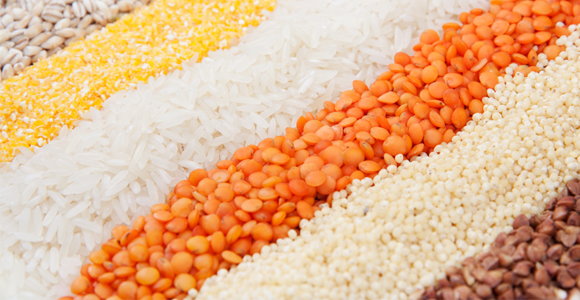Whether or not a carb-free diet is healthy depends on how you define and practice a "carb-free diet." If you eliminated all carbs from your diet, there would be very little left to eat. Most foods contain carbohydrates in the form of either starch, sugar or fiber. Foods that contain significant carbohydrate content include vegetables, fruits, beans, legumes and grains. If you totally eliminated carbohydrates you would find yourself malnourished.
Practicing a "Carb-Free Diet"
A "carb-free diet" that's extremely low in starch and sugar may be a healthy option for weight loss as long as you still intake the recommended healthy carbohydrate, fat and protein ratio. According to the Institute of Medicine, this ratio involves consuming 45 to 65 percent of your daily calories from carbohydrates, 20 to 35 percent of you daily calories from fats -- preferably unsaturated fats -- and 10 to 35 percent of your daily calories from protein.
In order to cut most starch and sugar from your diet and still consume adequate vitamins, minerals, fiber, protein, unsaturated fats and carbs, you will need to avoid sweets and junk foods. This means avoiding foods that generally supply calories only in the form of starch and added sugar, such as potato chips, cookies, cakes and pastries.
Different Types of "Carb-Free Diets"
Your definition of a "carb-free diet" may include avoidance of grains, beans, legumes and certain vegetables, such as potatoes, because they contain a higher amount of starch than other carbohydrate-laden foods. Your "carb-free diet" may also include avoidance of fruits, due to the fact they contain a higher amount of sugar -- albeit natural sugar -- than other carbohydrate-laden foods. However, these foods can be nutritious choices for fiber, vitamins, minerals and antioxidants. In moderation, they're fine. Just be sure to control your portion sizes.
If you decide to avoid carbohydrates that are higher in starch and natural sugar, you would be eating a "carb-free diet" that consists of only non-starchy vegetables and proteins, such as lean beef, poultry and fish. If you decide to go this route, remember that grains, beans, legumes, starchy vegetables and fruits are good sources of fiber, vitamins, minerals and antioxidants, so by reducing the intake of these foods, you also reduce the intake of their nutrients.
Getting All Your Nutrients on a "Carb-Free Diet"
Make sure you consume enough of your recommended daily nutrients from non-starchy vegetables. Choose a variety of different colored vegetables in order to get adequate vitamins, minerals and antioxidants. For example, one cup of raw non-starchy vegetables -- salad greens, cucumber and tomatoes -- or one-half cup of cooked non-starchy vegetables -- broccoli, asparagus and eggplant -- will provide you with 1 to 4 grams of fiber.
Foods that are primarily made up of protein or healthy fat tend to be low-carb or carb-free options, so it shouldn't be difficult to intake adequate amounts of protein and healthy fat on a "carb-free diet." There are around 7 grams of protein in 1 egg, 3 eggs whites, and 1 ounce of poultry, meat or fish. Fish, nuts and seeds contain protein with healthy unsaturated fats. You can also obtain healthy fats by using avocado or healthy oils, such as olive, canola or corn oil.

Jamie Yacoub, M.P.H., R.D. is a clinical dietitian with a Master's of Public Health in Nutrition. She obtained her Bachelor of Science in clinical nutrition from UC Davis after four years, during which time she participated in internships in several different nutrition environments including Kaiser Permanente and Women, Infants, & Children (W.I.C.). After graduating from UC Davis, she went on to study public health nutrition at Loma Linda University where she obtained her Master's of Public Health in Nutrition. Jamie completed the community nutrition portion of her dietetic internship as an intern for a Certified Specialist in Sports Nutrition. She completed both the food service and clinical portions of her dietetic internship at a top 100 hospital in the nation, where she was hired as the only clinical dietitian shortly after. Jamie now works as an outpatient clinical dietitian and is an expert in Medical Nutrition Therapy (M.N.T.) using the Nutrition Care Process (N.C.P.) including past medical history and current laboratory values as a basis of nutrition assessment.



